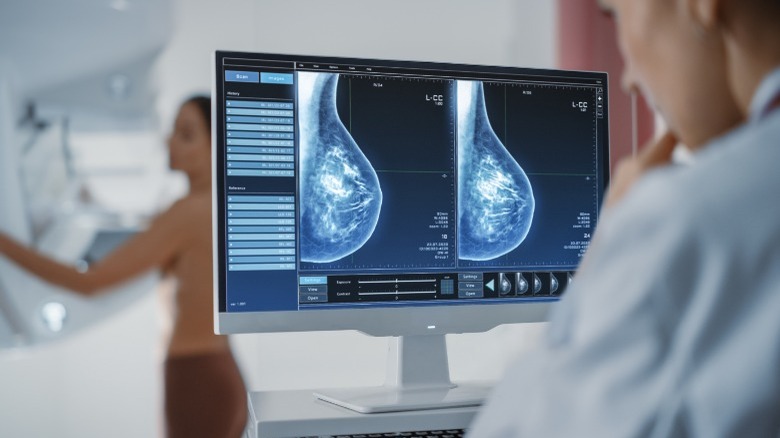What To Know About The First FDA Approved Targeted Treatment For HER2-Low Breast Cancer
There is some good news on the breast cancer treatment front. Following a clinical trial, the U.S. Food and Drug Administration (FDA) has approved the drug trastuzumab-deruxtecan for patients diagnosed with the HER2-low breast cancer subtype. Sold under the brand name Enhertu, the treatment was previously only authorized for women diagnosed as HER2 positive, per Healthline.
HER2 is a protein that promotes the growth of cancer cells. Formally known as human epidermal growth factor receptor 2, if people screened for HER2 earn an immunohistochemical (IHC) score of three, they are considered positive. Up until now, only patients in this category could receive Enhertu. Now, women who score below a three are placed in the HER2-low breast cancer category and are also eligible for this treatment. Until now, patients diagnosed with HER2-low breast cancer could only receive endocrine therapy or chemotherapy, per Healthline.
Dr. Parvin Peddi, a medical oncologist, told Healthline that the treatment is a more targeted form of chemotherapy with fewer side effects than traditional chemotherapy, including less nausea and fatigue. Every three weeks, patients receive the treatment intravenously, which includes a payload of an antibody, along with chemotherapy. When the antibody connects with the receptor, it releases the payload.
Healthline notes that while this treatment is not a cure and studies are ongoing, the results of this trial and the FDA approval are promising. It offers more treatment options for people who are not categorized as HER2 positive.
Here is when you should be screened for the HER2 protein
According to the American Cancer Society, women between the ages of 40 to 54 should have the option to be annually screened for breast cancer through mammographies. Those 55 and older should get mammograms annually or every two years. Even if you have no family history of breast cancer, the goal of screening is to detect issues earlier rather than later. This is because it is possible to get a breast cancer diagnosis prior to experiencing any symptoms.
If your health practitioner detects something abnormal in your mammogram, you may be advised to get a breast biopsy. This is when a small sample of breast tissue is removed from the breast and examined in a lab to confirm whether or not cancer cells are present, per Johns Hopkins Medicine.
If you test positive for breast cancer and it is invasive, health experts recommend asking your doctor to administer a test to check for the HER2 protein, per the Mayo Clinic. This is because the results of the HER2 test can have an impact on your course of treatment. They also advise doctors to re-test you for HER2 if your cancer recurs or spreads. While HER2-positive cancers can be more aggressive than other kinds of breast cancers, the prognosis for patients is good due to the effective treatments available.


